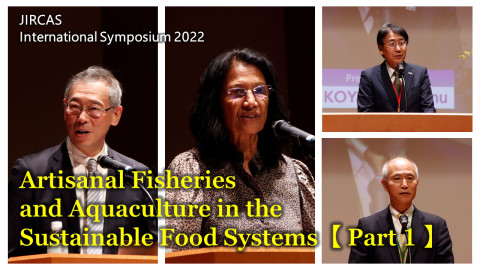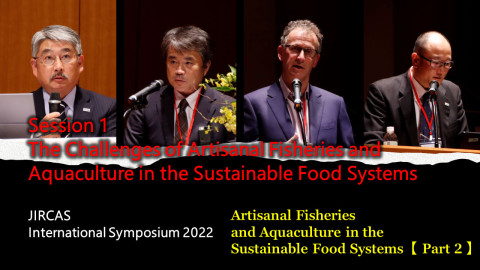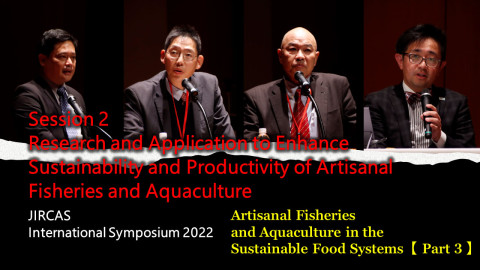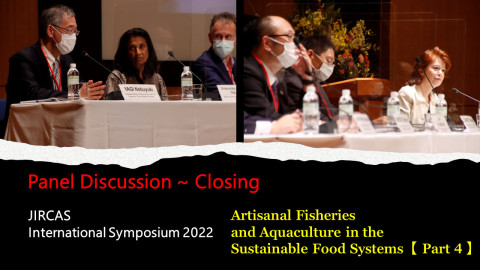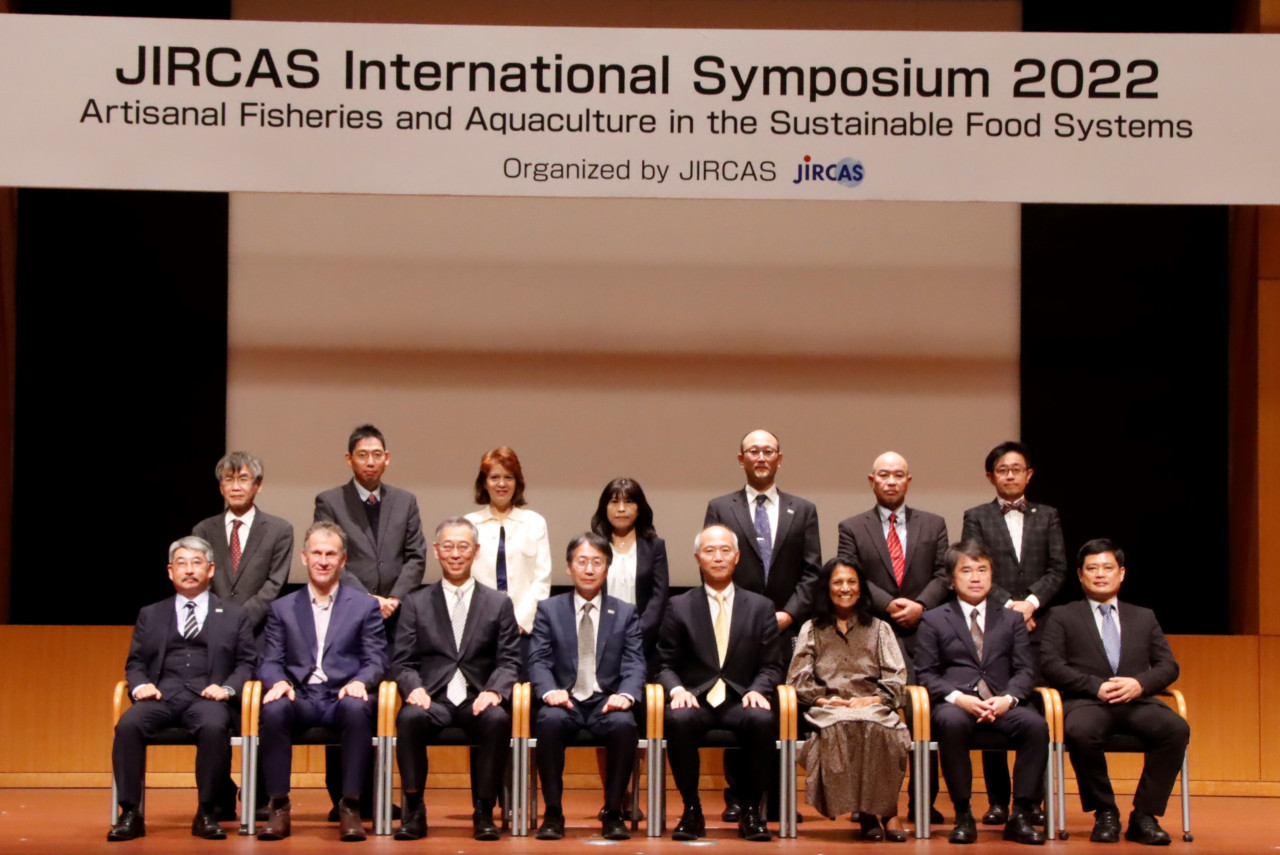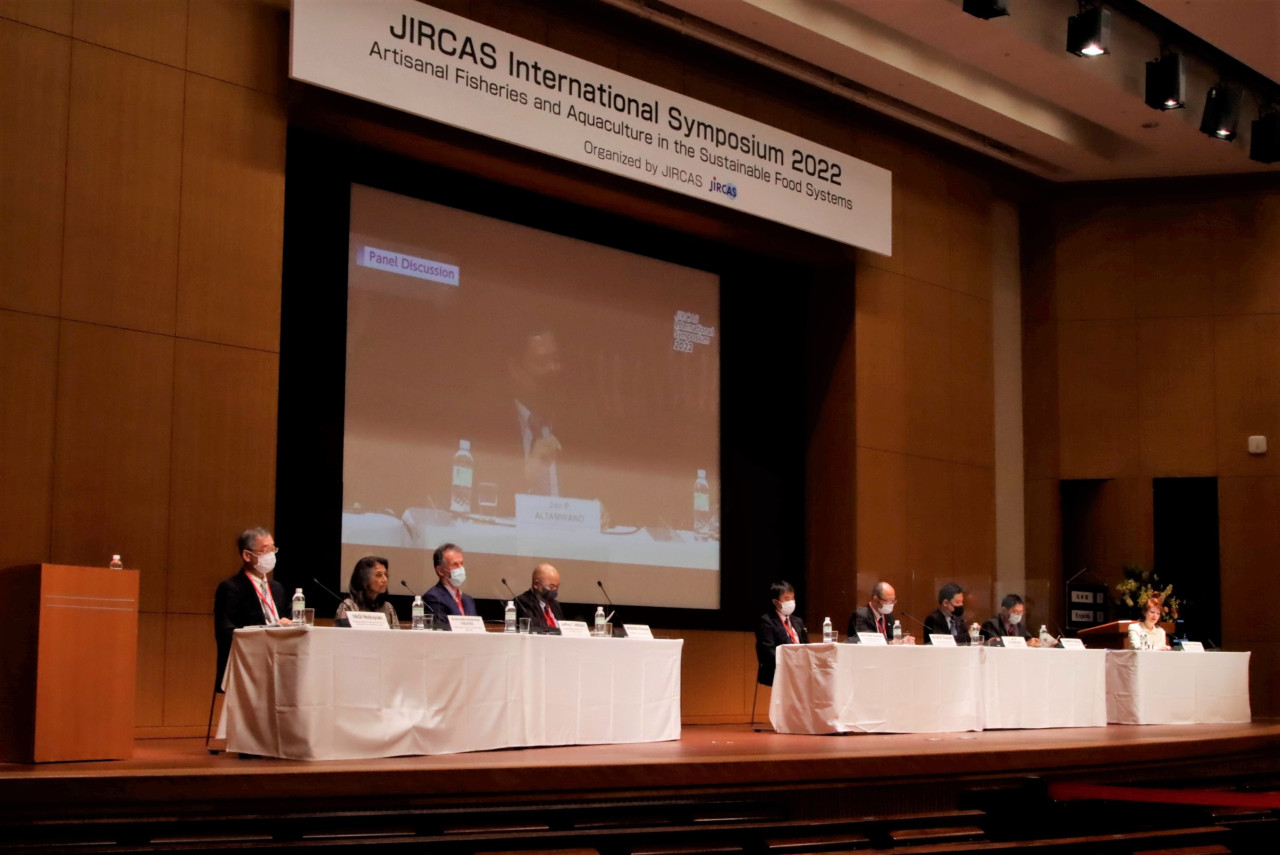The JIRCAS International Symposium 2022 “Artisanal Fisheries and Aquaculture in the Sustainable Food Systems” was held in hybrid format at Hitotsubashi Hall, Hitotsubashi University and online on November 22, 2022 under the auspices of the Ministry of Agriculture, Forestry and Fisheries (MAFF) and the Japan Fisheries Research and Education Agency (FRA).
The event was attended by 55 participants on-site and 198 online viewers from 16 countries around the world, including Japan and Southeast Asia, demonstrating the high level of interest in the role of smallholder fisheries and aquaculture in sustainable food systems.
We thank you very much for your participation.
Program
Link https://www.jircas.go.jp/en/symposium/2022/e20221122_jircas
For those of you who were unable to attend the event, we have posted a video of the event on the JIRCAS YouTube channel. (In the original language only, no Japanese-English interpretation is provided.)
|
Part1: https://youtu.be/wfs-l5xoIsQ |
Part2: https://youtu.be/rs_P-n-gQJc |
|
Part3: https://youtu.be/zz9OdVf8xfE |
Part4: https://youtu.be/wnAbjK4EKZw |
Summary of the event
Against the background of discussions at the 2021 UN Food Systems Summit and the 2022 International Year of Artisanal Fisheries and Aquaculture (IYAFA), this symposium focused on the importance of the role of smallholder fisheries and aquaculture in a sustainable food system, sustainability and increased productivity. In particular, it was held with the aim of forming a common understanding on the current status and issues of the implementation of science and technology innovation that is compatible with both, and providing an opportunity to exchange opinions on the direction of international joint research.
In the opening session, JIRCAS Pres. KOYAMA Osamu stated that the symposium aims to provide a forum for domestic and international researchers and the academic community to discuss opportunities and challenges for resilient, efficient, and sustainable fisheries and aquaculture. Then, Mr. KOYA Takashi, Director-General of the Fisheries Agency of Japan, gave a welcome address, expressing his hope that the active exchange of views at this symposium would deepen understanding of the importance of sustainable food production systems and the compatibility between sustainability and productivity improvement.
The keynote speeches were given by Prof. YAGI Nobuyuki, Graduate School of Agricultural and Life Sciences, University of Tokyo, on the role of fisheries and aquaculture in sustainable food systems, and Dr. Shakuntala Haraksingh THILSTED, Global Lead for Nutrition and Public Health, WorldFish, and winner of the 2021 World Food Prize, on the development of holistic and nutrition-sensitive approaches in aquatic food systems.
Session 1 on “The Challenges of Artisanal Fisheries and Aquaculture in the Sustainable Food Systems" was chaired by Dr. NAKASHIMA Kazuo, Director of JIRCAS Food Program, and featured presentations by Dr. MIYATA Tsutom, Director of JIRCAS Fisheries Division, and Dr. SAKIYAMA Kazutaka, Director of Aquaculture Research Department Production Engineering Division, Fisheries Technology Institute, FRA, on the challenges of small-scale fishery and aquaculture in Southeast Asia and Japan, respectively, in achieving sustainable food systems. Then, Dr. Jeffrey T. WRIGHT, Associate Professor of the Institute for Marine and Antarctic Studies, University of Tasmania, gave a lecture on the potential of seaweeds for reducing greenhouse gas emissions and combating climate change.
Session 2 on “Research and Application to Enhance Sustainability and Productivity of Artisanal Fisheries and Aquaculture” was chaired by Project Leader KANAMORI Norihito, and featured presentations by Senior Researcher YURIMOTO Tatsuya of the JIRCAS Fisheries Division, Professor MORIOKA Shinsuke of the Faculty of Environmental Science, University of the Human Environments, and Dr. Jon P. ALTAMIRANO of the Southeast Asian Fisheries Development Center / Aquaculture Department (SEAFDEC/AQD), on case studies on the development and utilization of propagation and aquaculture technologies for bivalves, small native fish species, and black tiger prawns, respectively. It was confirmed that research is important to address the empowerment of local communities and environmental sustainability, and at the same time, that local environments are very different and innovation must be tailored to the specific needs of each region.
The panel discussion was moderated by Project Leader Marcy N. WILDER of the JIRCAS Fisheries Division, who posed questions to each panelist. Prof. Yagi was asked about the overseas application of cases, and Dr. Thilsted was asked about how to enable more women and young people to have career and job opportunities related to the seafood and food system. Next, questions that had been received in advance (e.g., what the future balance of production between fisheries and aquaculture will be like, and what the future impact on marine plants and animals will be if the abnormal rise in sea water temperature due to global warming continues for a long time) were addressed by the panelists. Finally, a Q&A session was held to answer questions from the audience (e.g., access to seafood products in inland areas that are inaccessible from production areas).
In her closing remarks, JIRCAS Vice-Pres. YAMAMOTO Yukiyo thanked the speakers and participants, and made the following points in summary.
- We have greatly benefitted from the leading experts who shared their experiences of how best to address challenges in artisanal fisheries and aquaculture.
- While no single solution exists, multi-disciplinary approach can be a key to address not only the technical challenges small-scale operators face in locally specific contexts, but also identify support areas to overcome socio-economic constraints, including regulations and institutions.
- Accelerating innovations in artisanal fisheries and aquaculture requires not only local actions but also enabling commitment of all the stakeholders, from local communities, research institutions, private sectors, and policymakers.
We would like to thank everyone who attended this symposium and those who viewed it in the audience or online. We hope that this symposium will contribute to the promotion of scientific and technological innovation to achieve food and nutrition security and the development of a robust and sustainable fisheries and aquaculture industry that leaves no one behind. JIRCAS will continue to contribute to the development and dissemination of sustainable aquaculture technologies in the tropics based on ecosystem approaches in cooperation with domestic and international partners.

